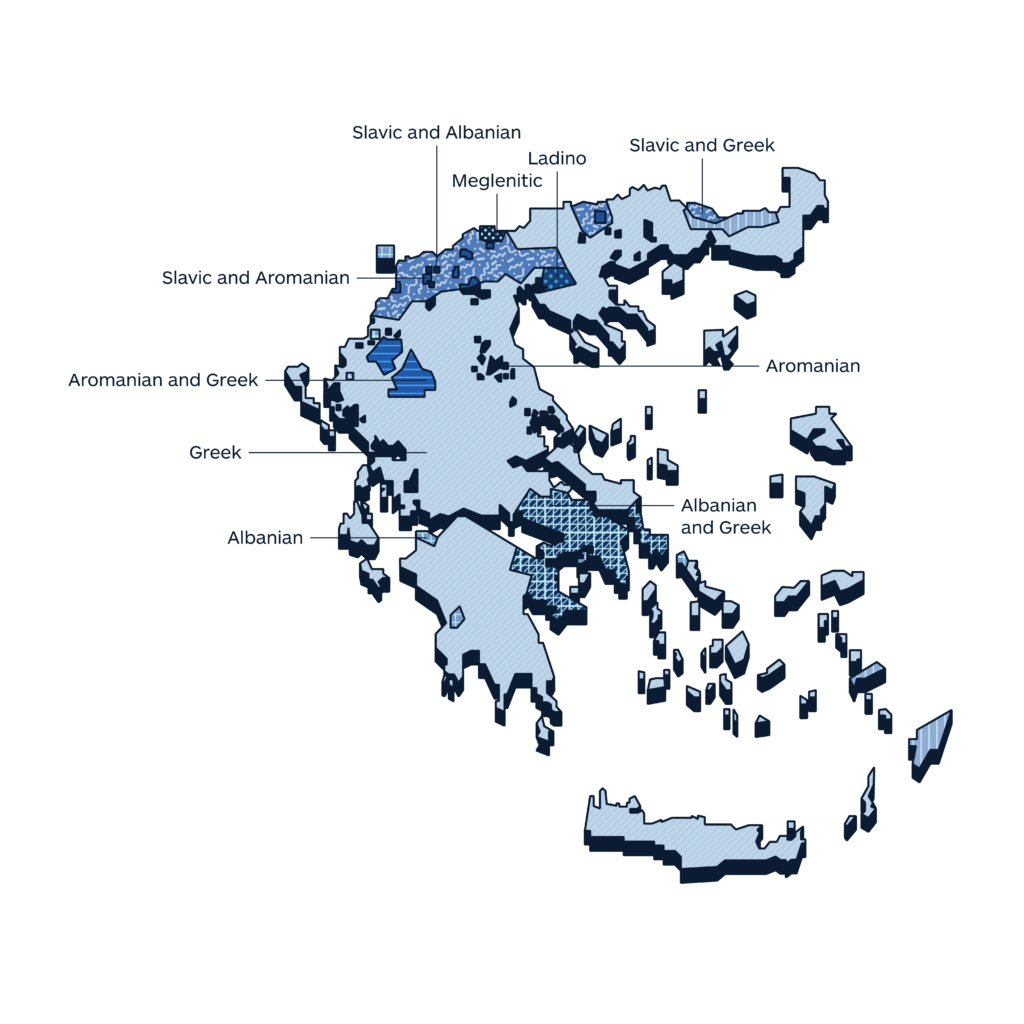Europe
To which language should you translate to localize in Greece?
What we know from our community
“Despite the fact that Greek is nowadays spoken by somewhat fewer people than in the distant times when it served as a lingua franca for a wide continuum of peoples and places, knowing the language remains in many respects a great asset with a payoff that extends far beyond what relates to living and working in modern Greece and Cyprus. This is so both because it makes much easier to understand many technical terms and ordinary words of a Greek origin that have become an integral part of other languages spoken in Europe and around the globe and because it provides access to the original text of a massive collection of writings that have long become known for their fascinating culture and far-reaching intellectual depth. Although this does not mean that knowing modern Greek suffices for a professional translation of texts that might span as far in time and place as the late Bronze Age, a wide-ranging antiquity, the medieval times of the Byzantine Empire and its early modern aftermaths, and the ritual language still in use by the Greek Orthodox and other Christian Churches, it certainly helps in case one is interested in mastering these versions of the language as well, as is even more the case for people who follow the opposite route, namely, from ancient to middle and modern Greek. And to add further to its current presence, Greek is an official language of the European Union; a recognized minority language in Albania, Armenia, Hungary, Italy, Romania, Turkey and Ukraine; and de facto spoken both by other Hellenophone populations and members of an ever-present Greek diaspora formed through various waves of migration in every corner of the earth, and by a considerable portion of other nationals in the Balkans who regularly cross Greece’s northern border in order to work, study, do some shopping or simply enjoy their time in Greece.
In present-day Greece things are luckily much simpler in what has to do with language. The vast majority of permanent residents use the standardized version of modern Greek taught at schools on an everyday basis, which stands in some contrast to Cyprus, where the regional variant prevails in informal everyday speech. As for regional dialects of the language in present-day Greece, some of them are still in currency in informal speech between their community members and are not always readily accessible to thirds, as is the case with the Cretan dialect, with the many Cypriots living in Greece, and with the Pontic dialect of emigrant Greeks with a descent from modern north-central Turkey. Other than these though, most of the smaller regional dialects or dialects of emigrant Greeks nowadays retain few and enclaved numbers of users and are on the verge of extinction. Among them one finds the Constantinople and Cappadocian dialects of displaced Anatolian Greeks, the Tsakonian dialect in eastern Peloponnese, a centuries-long domesticated Albanian dialect known as Arvanite, and, further in the north, other domesticated Aromanian dialects of old pastoral clans, the language of northern Greek Jews known as Ladino, and small dialects that draw from Slavic and Bulgarian. Furthermore, the north-east includes an officially acknowledged ‘Muslim minority’ with mostly Turk-speaking members and has a considerable Roma population who speak a regional version of the Romani language; whereas a small number of old displaced Armenian emigrants have been long preserving their own language as well.
This is still not where the linguistic landscape in Greece comes to a close. English literacy is highly common for people aged lower than 40, since most Greeks supplement their formal schooling while in K-12 and afterwards with long-year private tutor lessons of English and, quite often, of an additional European language. The main immigrant group comes from Albania and other than that present-day immigrants in Greece mostly come from parts of West and South Asia, Southeastern, Eastern and Caucasian Europe, and Africa.”
Kostantinos Bizas, D.Phil. in Political Thought & Conceptual History
LANGUAGE INSIGHT
Official language
Greek (97.4%)
Actual languages
Greek (97.4%), Turkish (0.9%), Macedonian (0.4%), Bulgarian (0.3%), Armenian (0.2%), Albanian (0.1%), other (0.7%).
What the top 150 best localized websites in the world do in Greece
(Top 150 websites listed in the Global by Design ranking – published annually by Byte Level Research, this report provides a list of globally localized websites, showcasing best practices and emerging trends in their globalization)
- 91/150 localize by translating into Greek
- 1/150 localizes by translating into Greek, Greek Sign Language, Romany (Northern Greece) and Romany (Southern Greece)
- 1/150 localizes by translating into Greek, French and Simplified Chinese
- 1/150 localizes by translating into Greek, French and German
- 1/150 localizes by translating into Spanish, French, Italian, German, Portuguese and Russian
- 1/150 localizes by translating into Spanish, French, Italian, German and Simplified Chinese
- 1/150 localizes by translating into Spanish, French, Italian, German, Portuguese, Russian, Simplified Chinese, Traditions Chinese, Korean and Japanese
- 1/150 localizes by translating into Spanish, French, Italian, German, Portuguese, Russian, Simplified Chinese, Traditions Chinese, Japanese, Bahasa Indonesia, Hungarian, Polish, Romanian, Turkish, Ukrainian, Thai and Arabic
-
3M
-
ABB
-
Accenture
-
Adidas
-
Adobe
-
Airbnb
-
Aldi
-
Amazon
-
American Airlines
-
American Express
-
Apple
-
Audi
-
Autodesk
-
Avis
-
Bayer
-
BMW
-
Booking.com
-
Bosch
-
British Airways
-
Bumble
-
Burberry
-
BYD
-
Canon
-
Capgemini
-
Cartier
-
Caterpillar
-
Chevrolet
-
Cisco Systems
-
Citibank
-
Coca-Cola
-
Costco
-
Dell
-
Deloitte
-
Delta
-
DHL
-
Disney+
-
Dyson
-
eBay
-
Eli Lilly
-
Emirates
-
Ernst & Young
-
Facebook
-
FedEx
-
Ford
-
Four Seasons
-
Fujifilm
-
GE
-
Gillette
-
GoDaddy
-
Google
-
Gucci
-
Haier
-
Heineken
-
Hermès
-
Hertz
-
Hilton
-
Hisense
-
Hitachi
-
Honda
-
Hotels.com
-
HP
-
HP Enterprise
-
HSBC
-
Huawei
-
Hyatt
-
Hyundai
-
IBM
-
IKEA
-
Intel
-
InterContinental Hotels
-
J&J
-
Jack Daniel's
-
Jehovah’s Witnesses
-
John Deere
-
Kellogg's
-
Kia
-
KPMG
-
L'Oréal
-
Land Rover
-
LEGO
-
Lenovo
-
Lexus
-
LG
-
Louis Vuitton
-
Lululemon
-
LUSH
-
Marriott
-
MasterCard
-
McDonald's
-
Mercedes-Benz
-
Merck
-
Microsoft
-
Mitsubishi Electric
-
Nestlé
-
Netflix
-
Nike
-
Nikon
-
Nintendo
-
Nio
-
Nissan
-
NIVEA
-
Oracle
-
Pampers
-
Panasonic
-
PayPal
-
Pepsi
-
Pfizer
-
Philips
-
Pitney Bowes
-
Porsche
-
Procter & Gamble
-
PWC
-
Revolut
-
Rolex
-
Royal Caribbean
-
Salesforce
-
Samsung
-
Sanofi
-
SAP
-
Sephora
-
Shopify
-
Siemens
-
Sony
-
Spotify
-
Starbucks
-
Steelcase
-
Stripe
-
Subaru
-
Tesla
-
The Church of Jesus Christ of Latter-day Saints
-
Tiffany
-
Tinder
-
Toshiba
-
Toyota
-
TripAdvisor
-
Uber
-
United Airlines
-
UPS
-
Visa
-
Volkswagen
-
Volvo Cars
-
Vrbo
-
Walmart
-
Western Union
-
Wikipedia
-
Wise
-
WordPress
-
Workday
-
Xerox
-
Xiaomi (Mi)
-
Zara
-
Zoom
If you need others information, below you can find a selection of economic/social/cultural data
Overview
Language
Official language
Greek (Demotic) 97.4%
T-index
0.26%
T-Index ranks countries according to their potential for online sales.
Dialects
Cretan, Tsakonian, Cappadocian, Maniot, Yevanic, Pontic, Thracian.
Other languages
Turkish (0.9%), Macedonian (0.4%), Bulgarian (0.3%), Armenian (0.2%), Albanian (0.1%), other (0.7%)
English
Very high proficiency (EF) – 12 of 112 countries/regions in the world- 10/34 position in Europe.
Demography
Capital: Athens
Currency: Euro
Population: 10,426,919 (2022)
Population density: 82/km2 (2021)
Economy
GDP: 217,581 billion USD (2022)
GDP per capita: 20,867.3 USD (2022)
Exports: $55.7 billion (2022)
Statistics
Internet users: 86.2% penetration, 8.90 million.
Unemployment rate: 12.4% (2022)
Urbanisation: 80% (2022)
Literacy: 93.9% (2022)
Conventions
Numbering system
Arabic numerals with comma as decimal separator, space or dot as thousands separator.
Date format: dd – mm – yyyy
Time: 24h time system
Country code: 0030
Language data sources: Worldatlas/Britannica//EF/Wikipedia; Demography data sources: IMF/Worldometers; Conventions data source: Wikipedia; Economy data sources: WTO/OEC/CIA/Esomar/Datareportal; Statistics data sources: Datareportal/WorldBank/UN/UNESCO/CEIC/IMF/Culturalatlas/Commisceoglobal
Facts and data
Economy
Imports
$94.5 billion (2022). Crude Petroleum ($13.1B), Petroleum Gas ($8.38B), Refined Petroleum ($6.69B), Packaged Medicaments ($2.57B), and Cars ($2.16B),
importing mostly from China ($11B), Germany ($8.78B), Russia ($8.74B),
Italy ($6.73B), and Iraq ($6.27B).
Financial inclusion factors (over 15 years of age)
• 85.5% have an account with a financial institution
• 12% have a credit card
• 10% make online purchases
Ease of doing business
It is moderately easy to conduct business (rated 68.4 out of 100) ranked 34th out of 34 OECD and high-income countries ranked 79th out of 190 countries worldwide (2019, World Bank).
Global Innovation Index
Ranked 27th out of 39 European countries, and 42th out of 132 worldwide.
The Global Innovation Index captures the innovation
ecosystem performance of 132 economies and tracks the most recent global innovation trends.
Exports
$55.7 billion (2022). Refined Petroleum ($16.4B), Packaged Medicaments ($2.74B), Petroleum Gas ($1.85B), Aluminium Plating ($1.17B), and Pure Olive Oil ($863M), exporting mostly to Italy ($5.82B), Bulgaria ($3.62B), Germany($3.45B),
Cyprus ($2.92B), and Turkey ($2.54B).
Main local online stores
Amazon.it, Apple.com, Zalando.it, Privalia.com, Esselungacasa.it, Shein.com, Unieuro.it, Eprice.it, Yoox.com, Amazon.com
Economic freedom
‘Moderately free’ (rated 55.1 out of 100) ranked 42nd amongst 44 countries in Europe ranked 113th worldwide out of 186 countries (2024, Heritage Foundation and Wall Street Journal).
Economy data sources: WTO/OEC/CIA/Esomar/Datareportal
Service Imports (2020)
Service Exports (2020)
Source: OEC
Trade balance of goods from 2012 to 2022
Source: Statista
Historical Data Trade Imports (2020)
The following section uses historical trade data imports from partners of Greece.
Historical Data Trade Exports (2020)
The following section uses historical trade data exports from partners of Greece.
Source: OEC
The Top Export Opportunities for Greece by Relatedness
Relatedness measures the distance between a country's current exports and each product by showing only products that Greece is not specialized in.
Greece's Most Complex Exports
The Product Complexity Index (PCI) measures the knowledge intensity of a product by considering the knowledge intensity of its exporters.
Source: OEC
Most Specialised Products by RCA Index
Specialisation is measured using Revealed Comparative Advantage, an index that takes the ratio between Greece observed and expected exports in each product
Source: OEC
Perception of products made in selected countries in 2017
Source: Statista
Which attributes do you associate with products made in Greece?
Source: Statista
Market Growth Imports (2020)
This score represents the likelihood that the given country will start importing that product in the next few years. It forecasts the opening of a new specific market.
Market Growth Exports (2020)
This score represents the likelihood that the given country will start exporting that product in the next few years. It forecasts the opening of a new specific market.
Source: OEC
Foreign direct investment, net inflows (% of GDP)
Source: WorldBank
Share of cash in total payment transactions in Greece from 2004 to 2018
Source: EOS Gruppe

T-index
Reach most of the online purchasing power
T-Index ranks countries according to their potential for online sales. It estimates the market share of each country in relation to global e-commerce.
Try it nowMedia
Media language Greek, English
Information channels
Defamation is a criminal offence, and political figures have launched legal actions against journalists, says the US-based NGO Freedom House. Journalists risk physical assault, particularly while covering protests.
Press freedom in Greece suffered serious setbacks in 2021 and 2022, according to the media rights group Reporters Without Borders, with journalists regularly prevented from covering issues from migration to Covid-19.
Veteran crime reporter Giorgos Karaivaz was assassinated in April 2021. Police said the killing bore the hallmarks of organised crime. In May 2023, two men were arrested. The case is continuing.
Established private networks operate alongside the public broadcaster. News, entertainment, comedy and game shows dominate peak-time viewing.
The media have had to weather Greece’s economic crisis. Facing declining circulation figures and advertising revenues, some outlets have cut back or closed altogether.
Public TV is operated by ERT and public radio by ERA.
Five private TV networks, all of them existing broadcasters, were awarded national TV licences in 2018. Officials said it drew the line under a long-running free-for-all in the sector.
The press
Ta Nea – daily, English-language pages
Ethnos – daily, English-language pages
To Vima – daily, English-language pages
Kathimerini – daily, English-language pages
Naftemporiki – financial daily, English-language pages
Television
ERT – public, operates three national networks
Epsilon TV – national, private
ANT1 – national, private
Mega TV – national, private
Alpha TV – national, private station
Star TV – national, private
SKAI TV – national, private
Radio
ERA – public
Easy 972 – commercial
Athena 984 – municipal Athens station, one of the first non-state radios
SKAI 100.3 – commercial network
Sfera 102.2 – commercial network
News agency
Athens-Macedonian News Agency – national agency, English- language pages
NewsIt – news portal
Nooz.gr – news portal
Media data source: BBC
Internet Data
Internet users
86.2% penetration, 8.90 million.
Share of web traffic by device
65.33% mobile phones, 31.84% computers (laptops and desktops), 2.82% tablet devices, others 0.01%.
Median speed of mobile Internet connection
69.12 Mbps
Median speed of fixed Internet connection
48.66 Mbps
Mobile connection as a percentage of total population
145.3%
Percentage of mobile connections that are broadband (3G-5G)
97.5%
Most popular web search engines
Google (97.8%), Bing (1.52%), Yahoo (0.42%), Duckduckgo (0.11%), Yandex (0.09%), Ecosia (0.02%).
Most used social media
Facebook (60.88%), Instagram (11.41%), YouTube (8.76%), X (8.28%), Pinterest (7.72%), Reddit (1.59%).
Internet data sources: Datareportal/Statcounter
Social statistics
Life expectancy
80 yrs (2021)
Average age of the population
45.6 yrs (2020)
Glass Ceiling Index
50.5 out 100, ranked 26th out of 30 countries.
The glass-ceiling index measures the environment for working women combining data on higher education, labor-force participation, pay, child-care costs, maternity and paternity rights, business-school applications, and representation in senior jobs.
CO2 emissions
4.8 metric tons per capita (2020).
World Happiness Index
Greece ranked 58 out of 146 countries, with a score of 5.948.
Religion
Religion is vital to Greek culture, but not significant in terms of relationships in everyday life.
Ethnicity
Greece is in the process of becoming a multicultural country. Many immigrants live and work in Greece, but people are not extremely tolerant of the situation because of political and historical reasons.
Urbanisation
80% (2022)
Unemployment rate
12.4% (2022)
Education expenditure:
86.5% of GDP (2019).
Health expenditure:
9.51% of GDP (2020).
Corruption perceptions Index
Greece scored 49 out of 100, ranked 59 out 180 countries worldwide.
Graduates (tertiary education)
Greece has the highest enrolment rates in bachelor’s programs of all OECD countries among 19- 24 year-olds and the second highest rates among 25-28 year-olds. Enrolment rates in master’s programs, however, are below the OECD and EU averages among 19-28 year-olds. Women make up 52% of new entrants to tertiary education. Women have also a higher completion rate (81% compared to 74%) at the bachelor’s level (2019).
Social statistics sources: WorldBank/UN/UNESCO/CEIC/IMF
The Data Factbook is a work in progress project. Our community is helping us to fill it up always with new and updated data. Your contribution is precious. If you want to help us, please write your advices at imminent@translated.com
Languages research
Languages and dialects in Greece

Legend
-
Slavic and Albanian
-
Meglenitic
-
Ladino
-
Slavic and Greek
-
Aromanian
-
Albanian and Greek
-
Albanian
-
Greek
-
Aromanian and Greek
-
Slavic and Aromanian
The geographical distribution of languages that you will find in the maps published in this section is a work in progress. Our community is helping us to fill it up with always new and updated data. Your contribution is precious. If you want to help us, please write to imminent.factbook@translated.com
Photo credit: Aris Sfakianakis, Unsplash


